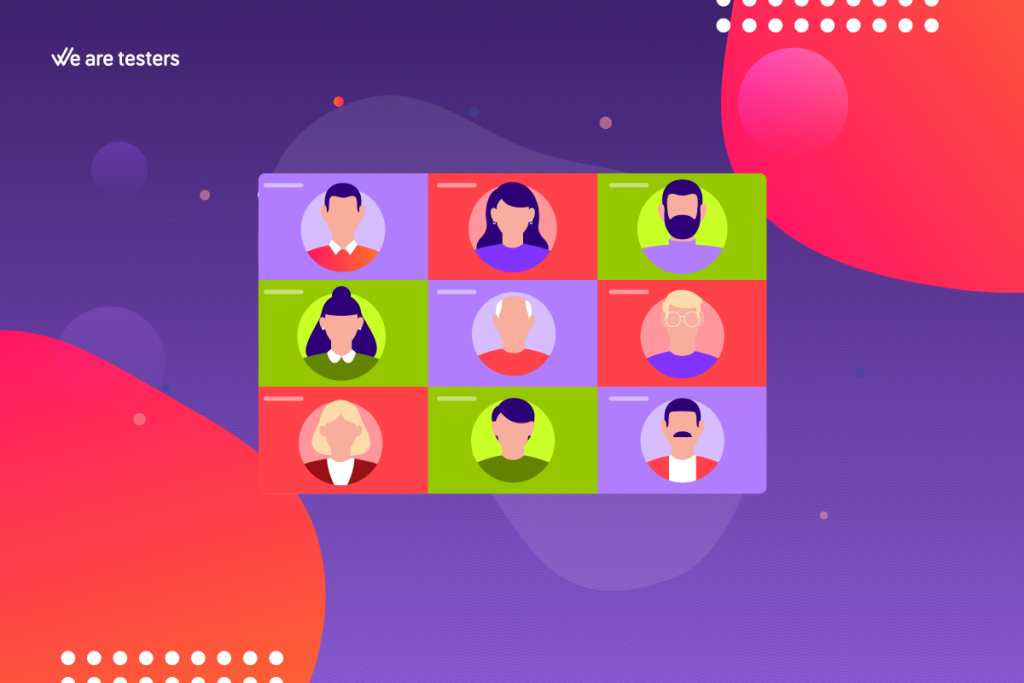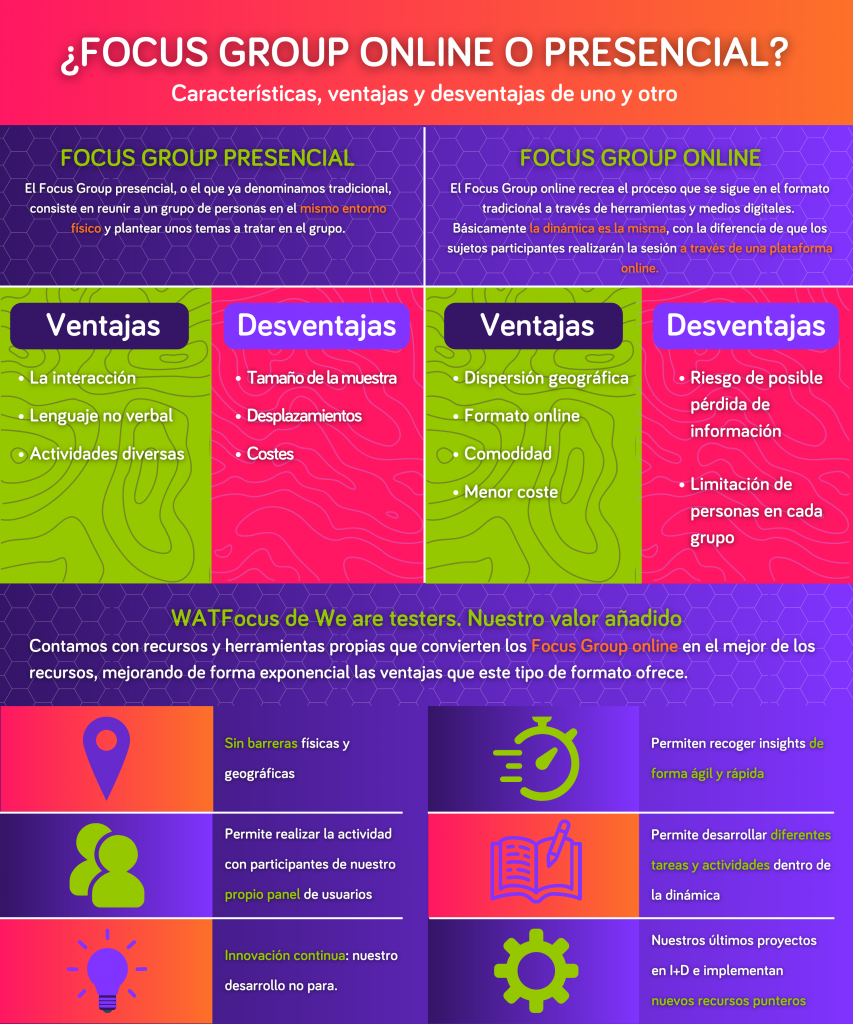
In the era of digital transformation, tools continuously generate new ways of working, acting, and executing actions. One of these changes has been the development of Online Focus Groups.
Online focus groups. What they are?
A Focus Group is a methodology focused on firsthand knowledge of the opinions of our target audience and potential customers or consumers.
Digitalization has brought an expansion of possibilities in the way and methodology for conducting online Focus Group studies in Spain and around the world. Now, it is possible to conduct this type of study traditionally, with physical presence, or online, utilizing digital tools to carry out the same actions.
Which one to choose, online or in-person Focus Group? Is one better than the other? Are both valid for conducting any type of Focus Group?
All of this is the subject of this article, where we describe the characteristics of both options. But we go even further because we also outline the advantages and disadvantages of both choices.
The final decision will be yours, but we recommend taking into account all the aspects we explain below.
Characteristics of In-Person Focus Groups
The In-Person Focus Group, or what we already call traditional, involves gathering a group of people in the same physical environment and presenting topics to discuss within the group.
These individuals will have been previously selected based on sociodemographic and/or consumption criteria.
The objective of these dynamics is to engage in real conversations with customers or potential customers or users of a product, service, or brand.
These individuals will be guided by a professional who will act as a moderator and will introduce the topics to be discussed.
This activity typically lasts between one and two hours. During that time, various questions about a product or service are presented, and participants will share their impressions, opinions, needs, preferences, etc.
These conversations allow for a deeper understanding of what customers or potential customers think, thus gaining firsthand insight into their concerns and needs.
As a result, it becomes possible to make decisions that bring the product or service closer to its audience.
Advantages of Conducting In-Person Focus Groups
- Interaction: the group is in direct contact, and its members interact with each other.
- Non-Verbal Communication: sharing the same physical space provides the opportunity to gather not only the expressed responses and information but also a lot of information that can be gleaned from non-verbal behavior, providing a more complete picture.
- Diverse Activities: In an In-Person Focus Group, various and diverse activities can be incorporated to liven up the session and encourage participant interaction and collaboration.
Disadvantages of In-Person Focus Groups
- Geographic Focus: If geographic location is relevant for the product or service, as behavior can change depending on the area, it would be necessary to conduct the same Focus Group in different locations, resulting in increased costs.
- Travel: In-person dynamics require participants to share the same physical space, often necessitating travel.
This extends the time required to conduct the activity and also introduces responsibilities related to other factors such as sustainability or economic costs. The cost of travel increases if you conduct part of the Focus Groups in Spain and part in other countries. - Costs: An In-Person Focus Group represents an often significant investment due to associated costs, including travel, room rentals, recordings, expenses, and more.
Characteristics of Online Focus Groups
Online Focus Groups or Virtual Focus Groups replicate the process followed in the traditional format using digital tools and media. Essentially, the dynamics are the same, with the difference being that participants will conduct the session through an online platform. This requires participants to have resources such as a computer, a good internet connection, a webcam, a microphone, and speakers or headphones.
Advantages of Conducting Online Focus Groups
- Geographic Dispersion: Since physical presence is not required, the participant sample can be easily expanded in terms of location. This allows for conducting Focus Groups in Spain and anywhere in the world.
- Online Format: Since the entire process is carried out over the Internet, there is no need for travel, and there is no requirement for a specific physical location to conduct the activity. Participants can do it from the comfort of their own homes. Additionally, technological devices enable participants to maintain visual and auditory contact and interact with each other.
- Participant Comfort: Participants in this type of virtual Focus Group often express a preference for this format because the online experience provides them with security, privacy, and psychological freedom to express their opinions.
- Lower Cost: As mentioned earlier, there is no need for a specific physical space to conduct the test. Participants do not have to travel, resulting in cost savings. Moreover, the savings in terms of expenses such as meals and other costs associated with participant involvement are also reduced, potentially leading to lower participant payments. Finally, there are numerous cost-competitive platforms available on the market for hosting Focus Group sessions.
- Observer Convenience: Observers have the ability to connect from different locations to view the dynamics in real time.
The disadvantages are the opposite of in-person Focus Groups.
How to Decide Between Conducting an Online or In-Person Focus Group?
To start, we will tell you that the decision between one format or the other should depend on the characteristics of the study to be conducted. The objectives and conditions of each research should be analyzed in each case.
For example, it would not make sense to conduct an in-person Focus Group for a study aiming to gather information from people residing throughout Spain.
However, how do you decide in cases where both options are valid?
The in-person Focus Group will continue to be a valuable tool. But the growth of online Focus Groups is clear.
The success of Focus Groups lies in the personal connection established during the sessions. And although we could say that in-person sessions have an advantage, the reality is that technological tools are increasingly more developed, providing satisfactory experiences.
Furthermore, technological barriers are also decreasing, and today, Internet penetration is nearly 100%, with technology use democratized and widespread among people of all ages and backgrounds.
How We Can Help at We are Testers with Our WATFocus
At We are testers, we are very clear: we have our own resources and tools that make online Focus Groups the best choice, greatly enhancing the advantages of this format.
Our tools are designed to overcome physical and geographic barriers, allowing us to collect consumer insights quickly and efficiently.
Our WATFocus tool also allows for the execution of various tasks and activities within the dynamics, such as surveys or debates to complement qualitative research.
You can conduct the activity with participants from our own user panel, meticulously segmented for each research, or with your own community.
Additionally, We are testers is committed to research and innovation development in our field. Thus, we work to conceive and create new tools that enable more effective and efficient research.
Soon, we will see the results of our latest R&D projects. But we can already announce that in the very near future, we will be implementing new resources, such as natural language semantic analysis and automatic transcription of audio to text.
The paradigm has changed, and society has changed as well. That’s why online Focus Groups will become useful, agile, and valuable tools for market research.
Here’s to a long and prosperous life for online Focus Groups!
Planning to conduct a Focus Group in Spain or anywhere else in the world? We’re sure we can help! Contact our experts to learn all the details.
Update date 30 July, 2024


